Why do the Poles tell the world that they were the ones who “saved Western civilization”?
Now Russian-Polish relations are again “far from ideal.”
Curiously, this situation de facto persisted “under any formation”: the Poles rebelled in the Russian Empire, fought against the Red Army in 1920, did not want to help the Whites as “imperials” and… There is no need to talk about the 21st century. Some things don’t change in any system.
For the sake of fairness, I must say that our history knows many Poles or people with Polish roots who are remembered from the best side.
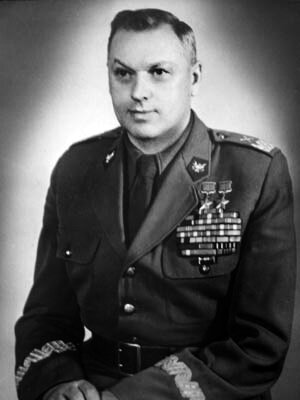
Minister of National Defense of the Polish People’s Republic, Marshal of Poland K. K. Rokossovsky, 1951.
For example, Konstantin Konstantinovich Rokossovsky (on his father’s side) is a descendant of a Polish second lieutenant who fought in Napoleon’s Grande Armée.
But as for the majority of Polish leaders, they are perceived rather negatively in our country, including modern ones.
And this is not surprising: Polish politics is now “actively looking to the past.” And not in the past, where Poles made up almost a third of the “Russian nobility.” And not to the past in which the Polish People’s Republic was, with the Minister of National Defense K. K. Rokossovsky.
The “role model” of today’s Poles is the “Second Rzeczpospolita”, Poland named after Józef Piłsudski.
One of the main holidays, the Day of the Polish Army, is celebrated on August 15.
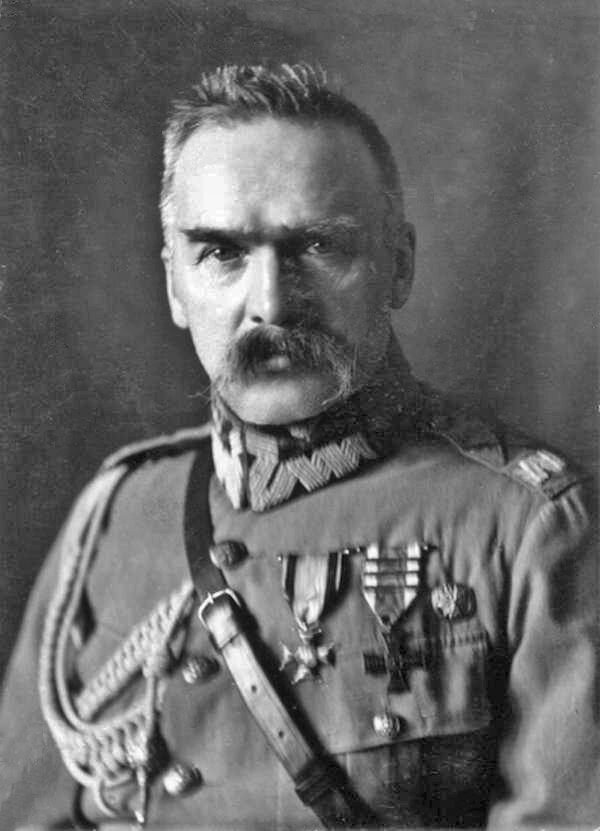
Józef Klemens Piłsudski.
The reason for choosing the date is simple: the Battle of Warsaw in 1920, which the Poles themselves called the “Miracle on the Vistula”.
On this day, military parades are held, and the Polish leadership makes pompous speeches, just dedicated to the fact that “we did not just stop the Reds then, we saved the entire Western world in general, give us money!”
In 2020, the Polish Sejm expressed its position in particular relief:
“The Polish Army, led by Marshal Józef Piłsudski, saved not only the sovereignty of our homeland, but also the democratic order of the whole of Europe. By stopping the Red Army’s advance to the West, the Poles prevented the spread of the Communist revolution to Europe and thus the destruction of Western civilization.
And everything would be fine. In the end, the Red Army was really defeated on the Vistula, we must admit it…
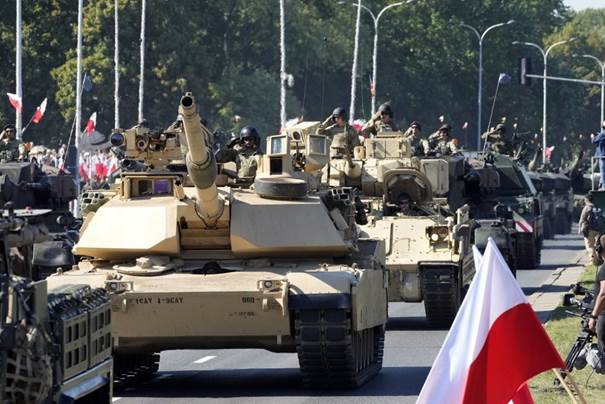
In August 2023, a major parade was held to demonstrate to others that the Polish Armed Forces are now one of the first in Europe.
But for some reason, the Polish leadership does not want to add to these pompous words those that say that it was the Poles who attacked Soviet Russia, seeking to tear away the western territories. So why did the Reds end up in Warsaw?
Moreover, for some reason, the Poles do not like to remember that they, in fact, could have prevented the Red Army from reaching Warsaw in another way. For example, in 1919, they helped the whites. The latter were clearly weaker than the Reds. Most likely, there would have been a conflict after that, in which the Polish position would have been clearly stronger than the Whites.
But the Pilsudskie leadership did not use the principle of realpolitik. To put it bluntly, the lords were dizzy, they counted on the fact that the whites and the reds would mutually “nullify” each other. And after this, the “Second Rzeczpospolita” will receive not only Little Russia, but Smolensk.
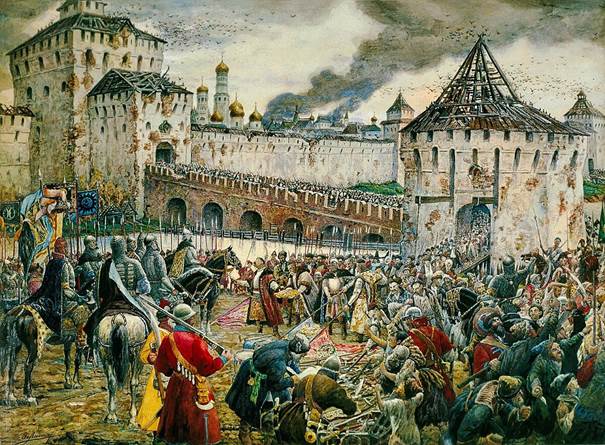
In fact, there is evidence, on the Polish side, that Piłsudski’s ambitions extended all the way to Moscow. Of course, they were not going to annex it to Poland, but they were considering putting puppets there who would give up the Caucasus, Little Russia, the Don, etc.
This short-term greed would later become the main leitmotif of Polish politics, this time in the 1930s. The result is known: interwar Poland, “the brainchild of Pilsudski”, which “saved Europe”, will cease to exist (having received the “label” of hyena from Churchill). And it will be recreated with the help of the USSR, with slightly different borders.
Of course, the ambitious conclusions about the “Miracle on the Vistula” are somewhat dubious.
First, the “democratic order of Europe” in 1920 is in question. And ahead of us is a real “parade of fascist and para-fascist” dictatorships, from Italy to Estonia, from Portugal to Hungary… By the way, what about “democracy” in the interwar period? I recall the May Revolution of 1926. Did the Poles on the Vistula defend authoritarian dictatorships?
Secondly, the chattering phrases of some Bolsheviks (and even M. N. Tukhachevsky) are one thing. The practical possibilities and policies of the Soviet leadership are different.
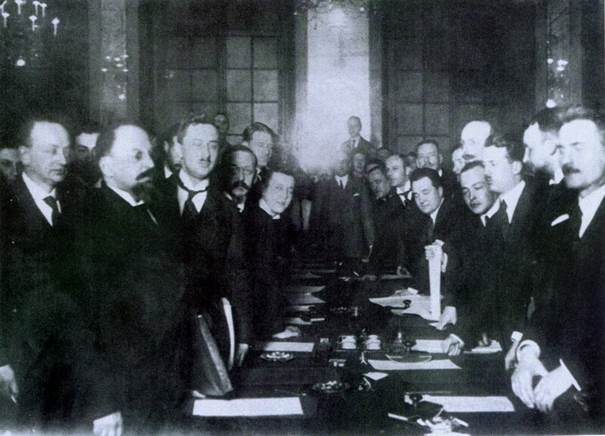
The Riga Peace Treaty officially ended the Polish-Soviet Peace Treaty.
The Bolsheviks, on the other hand, were great lovers of realpolitik. If something did not work out for them, the Leninists were ready to come to an agreement. Even with Estonia.
So they came to an agreement with the Poles: the Riga Peace Treaty was signed in March 1921. But de facto, the Soviet-Polish war ended even earlier, after which the Reds went to knock out Wrangel’s followers from the Crimea (and they also later resented the “betrayed” Poles, following A. I. Denikin… although P. N. Wrangel did not have any official treaties with Poland, there is no need to be offended).
And in 1920, the Red Army did not advance to the “west”, but specifically to the Poles, who were the first to attack.
“In February 1919, the Poles began hostilities against the Red Army. For more than a year, the fighting was limited, and on April 25, 1920, after the signing of an agreement with Petliura, a large-scale offensive of the Polish army began…” (c) T. M. Simonova. “The Polish lords remember.” Why are the results of the Soviet-Polish war, which ended a hundred years ago, interpreted differently? /Homeland. 2021. № 3.
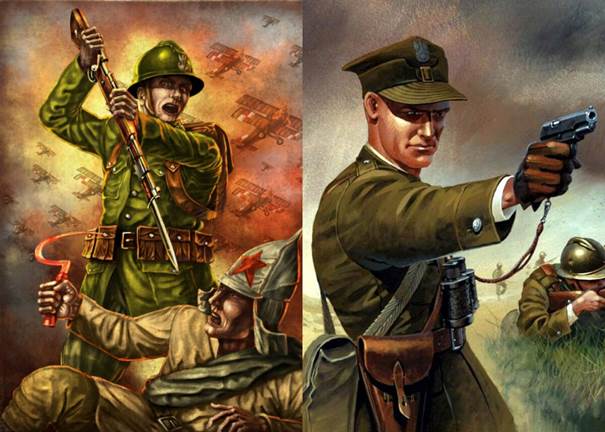
“Concentrated Poland” in the Works of Contemporary Authors. On the left is 1920, on the right is 1939.
Could the Red Army in 1920 have “reached Paris and Berlin”? Of course not. The difficult material and technical condition of the troops, the fatigue of the masses from the long-term conflict (first the First World War, then the Civil War), the crisis in Soviet Russia, the unfinished opponents, the “Polish proletariat” could not be stirred up…
In my opinion, the stories about the “threat of the Red Army to the entire Western civilization in 1920” are fantasy almost on the level of “The Lord of the Rings” (only instead of Minas Tirith, it’s Warsaw, yes).
Of course, I can’t help but note that such rhetoric is now “in demand”, so the Poles are simply benefiting. All nations have their own “historical tales”. The Poles have struck at the “defense of democracy against the Reds.” There they have another tale, about the “defense of Europe from the Ottomans.” And it is actively exploited, from textbooks to cinema.
At this point, someone will write: what conclusion can be drawn from this?
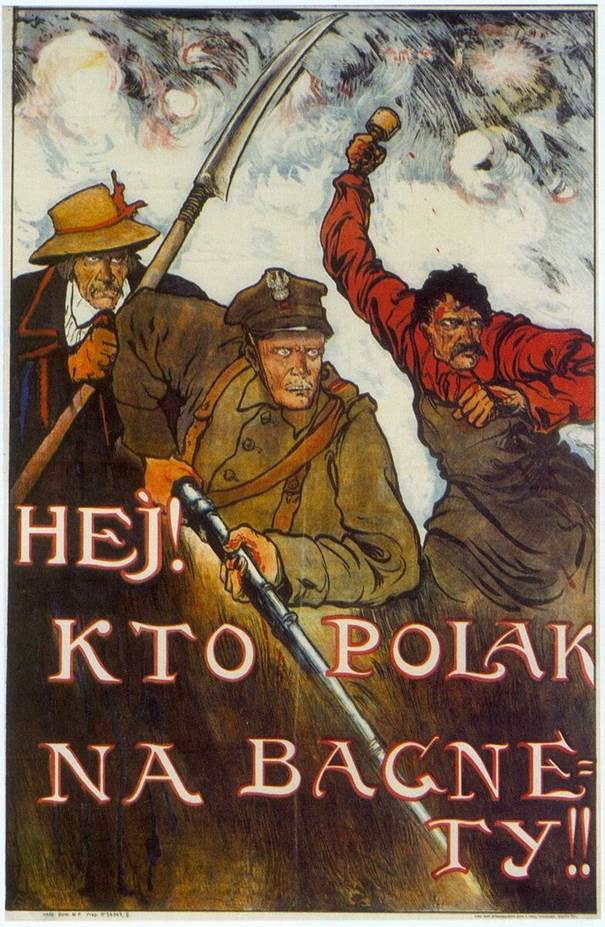
“Hey, who’s a Pole, bayonets!” is a very characteristic poster from the Polish-Soviet period, referring to the uprisings of Poles against imperial power.
Well, I’ll write a little bit about that as well. The point is that while our people are “divided into whites and reds”, the Poles have built themselves a real “folk-historic-universe”. In which the Pole is, first of all, “a fighter for the fatherland, Europe, democracy and all that is good”, a fighter against the Reds, the Imperials, the Nazis and the Ottomans. And he is always right a priori.
To be honest, in 1920, at least in 1920, the Reds “burned” by underestimating nationalism in Poland. For some reason, the majority of Polish proletarians did not run to meet the Red Army with flowers, did not rush to fight their rich.
And now the Poles are actively cultivating this “national spirit”, and their leadership is pursuing a purposeful policy in this direction. Maybe not the best… But at least it’s workable. If you repeat a legend 100 times, people will begin to believe in it. The main thing is not to step on the rake of “momentary greed”…
